Both changes, taking effect Aug. 1, ensure that eligible beneficiaries will always have their entire tuition covered at Fordham, as they do now, and will never have to worry about the University running out of seats for them.
The changes “underscore Fordham’s commitment to serving those who serve our country,” said Andrea Marais, Fordham’s director of military and veteran higher education, engagement, and transition.
Eliminating Worry for Veterans
The cap removals are expected to clear up confusion about Fordham’s support for student veterans. For years, the University has covered 100% of tuition and fees for eligible Yellow Ribbon beneficiaries, who also receive a government stipend for books and living expenses.
But service members may never find out about these benefits. Checking out Fordham’s Yellow Ribbon program on the government’s website, they sometimes give up after seeing the caps on tuition coverage and enrollment—even though neither limit has ever been reached.
“Some people may be deterred by the cap, not realizing that our tuition falls below it,” Marais said. “And the posted limit on applicants may sow doubt as well, since there’s no way to know whether the limit has been reached. This announcement eliminates all of that uncertainty.”
Yellow Ribbon Program + G.I. Bill = Full Tuition Coverage
Through the Yellow Ribbon Program, the government partners with private universities to give added funding to veterans who qualify for the full tuition amount ($27,120 per year) offered under the Post-9/11 G.I. Bill.
Fordham’s tuition benefit cap was so high that the University never needed to turn away any eligible veteran—and with the cap gone, it won’t ever need to. That’s good news for service members dealing with financial jitters, said Matthew Butler, PCS ’16, senior director of Fordham’s Office of Military and Veterans Services.
“Veterans aren’t in the position to take any chances” when considering their college costs as they’re transitioning out of the military, he said, also noting that Yellow Ribbon beneficiaries at Fordham receive one of the highest housing allowances in the country.
Michael Condit, a former Army infantryman and recruiter who just completed his bachelor’s degree in economics at Fordham’s School of Professional and Continuing Studies, said veterans may also be looking for a reason to rule themselves out, thinking “oh, I’m not a college person.”
“When you hear that there are caps and restrictions, you might [think], ‘Well, I don’t want to get in line just to be told ‘no,’” he said.
Supportive Community
Assimilating into Fordham after five years of active duty in the Army was “a great experience,” said Miguel Angel-Sandoval, a senior majoring in Real Estate with a minor in economics in the School of Professional and Continuing Studies and a candidate in Fordham’s ROTC program. He’ll be graduating in May with a job already secured at RSM real estate consulting agency.
He was welcomed by members of Fordham’s Student Veterans of America chapter and others who helped erase any feeling of discomfort at being an older student. Coming to Fordham “was the best decision I’ve ever made,” he said.
To learn more about military benefits and opportunities at Fordham, please contact the Fordham Veterans Center at [email protected] or call (212) 636-6433.
]]>Today we celebrate veterans, especially the many members of our own Fordham community who have served with courage and fortitude. We have more than 300 student veterans on our campuses, about 150 student cadets and midshipmen, and countless others in our faculty, staff, and administration. Fordham has a proud history of educating heroes, including six Medal of Honor winners.
This year, we celebrated 175 years of military service and training. In 1848, anti-immigrant and anti-Catholic forces in the aptly named Know-Nothing party threatened to burn down the Fordham campus. New York state issued Fordham 12 muskets, and lore has it that Fr. John Larkin, S.J., later led students on patrol.
Thus was born our tradition of military training and service. By World War II, Fordham’s ROTC programs were producing more officers for the Army than West Point. Fordham was an early leader in welcoming thousands of GI Bill veterans. We are thrilled to continue to attract remarkable and dedicated veterans, determined beyond measure.
On behalf of all of the rest of us, we thank you, not just with words but with constant efforts to support you better.
All my best,
Tania Tetlow
President
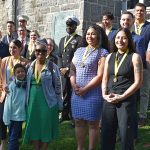
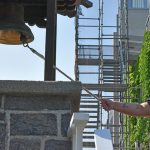
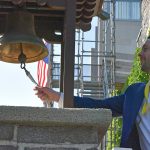
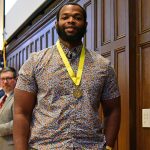
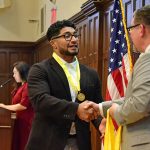
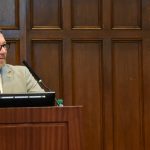
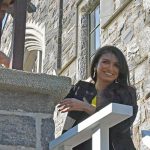
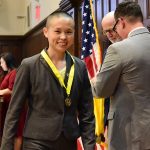
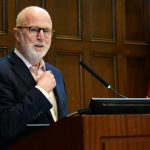
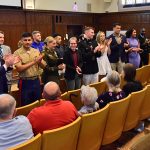 On May 19, the day before commencement, Fordham honored its graduating student veterans and military-connected students with a ceremony that highlighted the University’s rich and varied legacy of military service.
On May 19, the day before commencement, Fordham honored its graduating student veterans and military-connected students with a ceremony that highlighted the University’s rich and varied legacy of military service.
In an address to the 23 graduating seniors, Matt Butler, PCS ’16, director of military and veterans’ services at Fordham, said they were “added to that legacy” because of their achievements in the armed services and at Fordham.
“As military-connected students, you have demonstrated incredible strength and courage, balancing the demands of military service, post-military service, and the pursuit of academic excellence,” he said. He also lauded them for “taking extra steps to go beyond what is required of you to support your fellow Fordham students, to support your families, to support your communities.”
A ‘Deep and Broad Community’
Fordham’s military-connected students include veterans, active-duty service members, reservists, National Guard members, and service members’ spouses and children. The annual ceremony honoring them began four years ago. As in years past, it began in Keating Hall, with each student receiving a yellow ribbon medallion before everyone walked to the nearby Victory Bell and gave it a ring.
The guest speaker, Gerry Byrne, FCRH ’66, a prominent media executive and entrepreneur, recounted his Vietnam War experience as “a 23-year-old officer with 44 19-year-old [Marines] that are looking at me as God and hoping that my decisions will allow them to be around at the end of the day.”
He likened the experience to receiving “a master’s degree in leadership.” And he spoke of how his life’s pursuits constantly brought him into contact with other veterans and showed him how extensive America’s military-connected community is.
“When you think about this community that you’re a part of, just think about it in a way that is deep and broad,” he told the graduates. “It is a gigantic community that just needs to be better recognized.”
175th Anniversary of Military Service
This year, Fordham’s ROTC and student veteran leaders are trying to bring Fordham’s military-connected community closer together through an outreach effort, part of a yearlong campaign marking the 175th anniversary of military service at Fordham.
“Fordham’s men and women have defended the Constitution in every clime and place since 1848, when New York state issued Fordham 12 muskets … to defend the school against xenophobic mobs,” Butler said.
Later that century, Fordham graduate James Rowan O’Bierne, who led the capture of President Lincoln’s assassin, orchestrated a formal partnership between Fordham and the Army, which extended into today’s ROTC program, Butler said. By World War II, Fordham was producing more Army officers than West Point was, he said.
He also added a detail to the story of Fordham’s Victory Bell, originally part of a Japanese warship sunk during World War II and given to Fordham by Admiral Chester Nimitz to commemorate the University’s wartime sacrifices. Students had actually petitioned the general for some recognition of those sacrifices, given that approximately 223 people from Fordham lost their lives in World War II, Butler said.
He noted the many distinguished alumni in the University’s Hall of Honor who served in the military—a New York governor, a four-star general, Medal of Honor winners, business executives. “Graduates, let this be an inspiration to you as you add to this deep story of service and sacrifice,” he said.
Register here to be connected with others in Fordham’s military-affiliated community.
]]>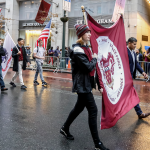
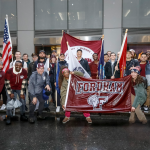
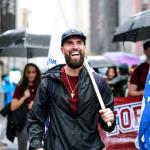
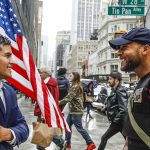
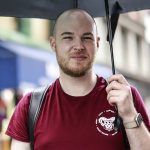
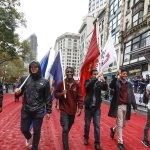
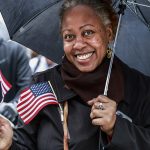
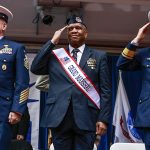
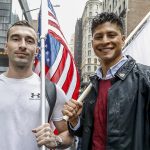
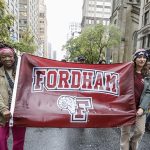 On Friday, Nov.11, Fordham’s military community came together to march in New York’s 103rd annual Veterans Day Parade. ROTC students, student veterans, alumni, administrators, friends, and family joined fellow veterans to honor and thank American veterans for their willingness to serve and sacrifice for their country.
On Friday, Nov.11, Fordham’s military community came together to march in New York’s 103rd annual Veterans Day Parade. ROTC students, student veterans, alumni, administrators, friends, and family joined fellow veterans to honor and thank American veterans for their willingness to serve and sacrifice for their country.
The parade is the country’s largest Veterans Day event, bringing together roughly 20,000 participants including 300 marching and vehicle units, along with marching bands, floats, and more. Participants were led by this year’s Grand Marshal, Vince M. Patton III, the Eighth Master Chief Petty Officer of the Coast Guard, as they marched up Fifth Avenue from 26th to 45th Street.
]]>Unlike most federal holidays, we do not move the celebration of Veterans Day to a more convenient Monday because the date itself has such meaning. In 1918, the armistice to end World War I was signed on the eleventh hour of the eleventh day of the eleventh month. If you have ever been in central London at that moment, traffic stops and the bells toll.
In this country, we honor all veterans today, those who served in combat and those who protected us from future combat through their service. And we remember their families, who also make so many sacrifices.
Fordham is forever shaped by the determination and courage of our own veterans, who served both in peacetime and in combat—from the American Civil War to Afghanistan. Fordham alumni have been awarded six Congressional Medals of Honor and seven Presidential Medals of Freedom, a record probably unmatched outside of the military academies.
For all of the veterans in our Fordham community, you have our endless gratitude, for your service and for the gifts you bring to our community. We honor you today and every day.
All my best,
Tania Tetlow
President
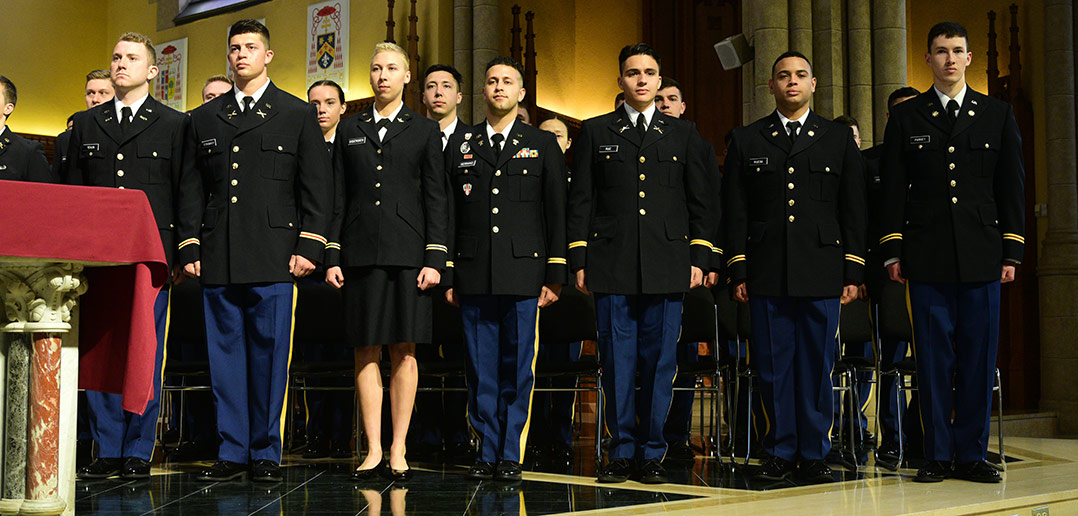
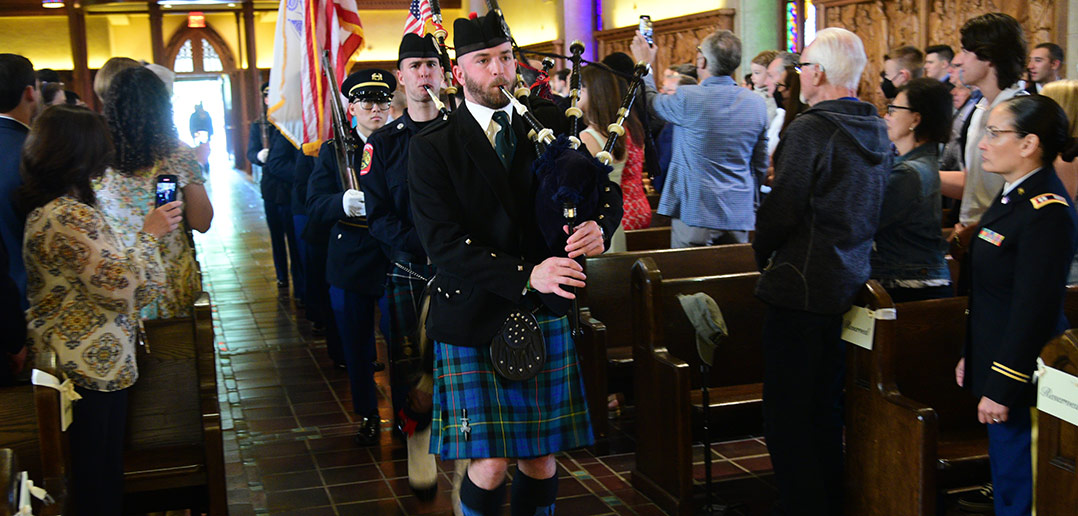
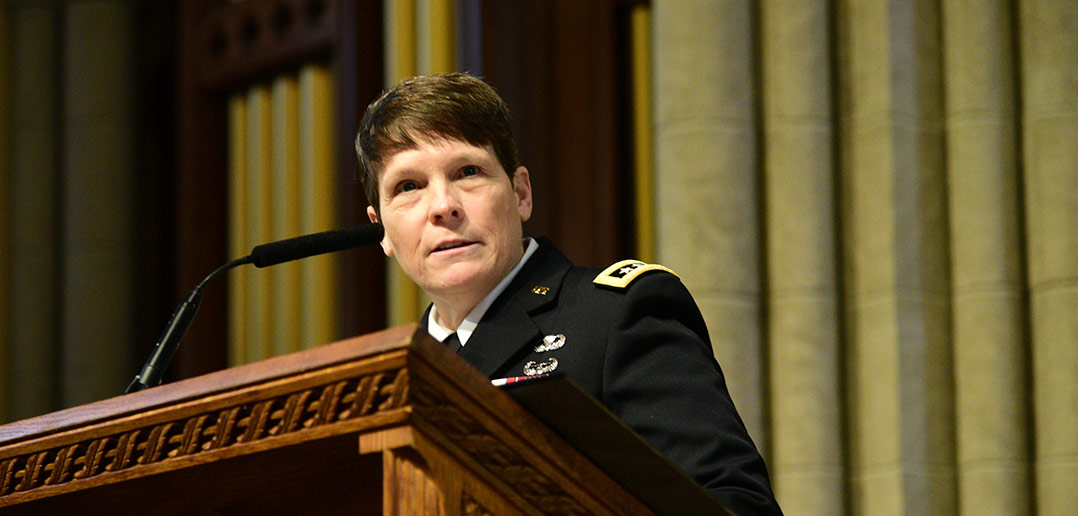
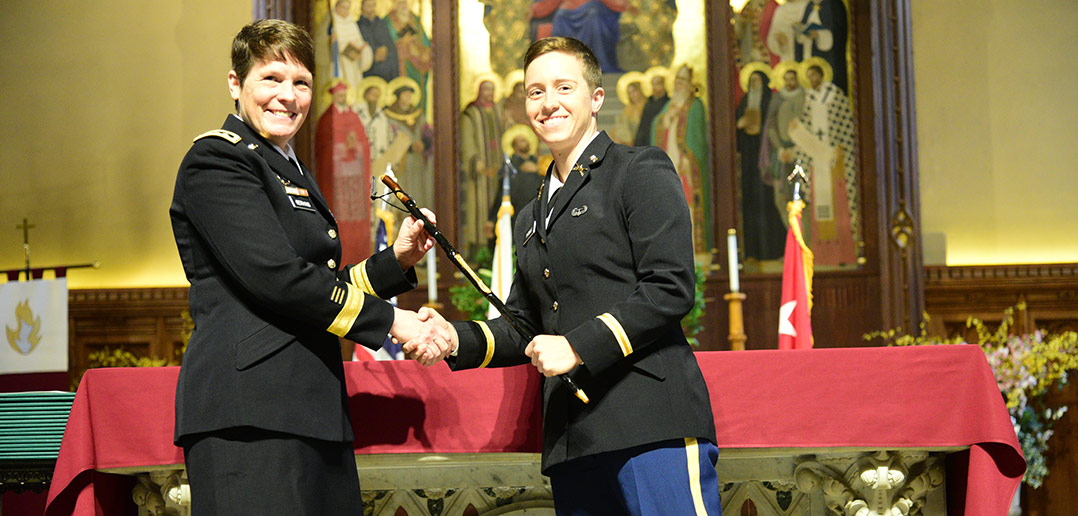
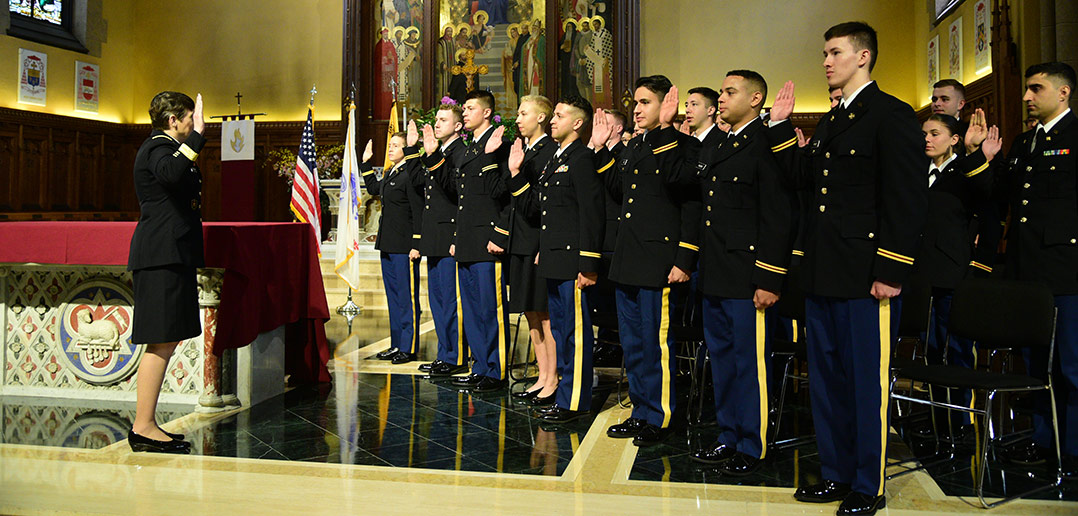 At a May 20 commissioning ceremony at the University Church on the Rose Hill campus, 24 cadets in the Fordham ROTC program became 2nd lieutenants, sworn in by a seasoned military leader who gave a stirring address about the changes and challenges awaiting them.
At a May 20 commissioning ceremony at the University Church on the Rose Hill campus, 24 cadets in the Fordham ROTC program became 2nd lieutenants, sworn in by a seasoned military leader who gave a stirring address about the changes and challenges awaiting them.
“As you will soon find out, your service will be a transformational experience,” said Lt. Gen. Maria R. Gervais, a highly decorated 35-year Army officer who serves as deputy commanding general and chief of staff with the U.S. Army Training and Doctrine Command at Joint Base Langley-Eustis in Virginia.
As Army officers, she said, “you will practice leadership each and every day, in everything you do.”
“You will lead the best soldiers in the world, and they will be hungry, hungry, for your leadership,” Gervais said. “My advice to you is even on your worst day, your worst day, it must be the best day for the soldiers that you lead. Each and every day, you should strive to be a leader that inspires your soldiers.”
It was the 93rd commissioning ceremony for the Fordham University Army Reserve Officer Training Corps, also known as the Yankee Battalion. The program trains cadets from Fordham and other New York-area universities; nine of this year’s cadets were graduating from Fordham.
It was also the last commissioning ceremony for Joseph M. McShane, S.J., who is stepping down as president of Fordham at the end of June. In his own remarks, Father McShane lauded the cadets for being leaders and role models on their respective campuses.
“You have spent long hours in drills. You have spent your summers not at the Jersey Shore but in camps where you rubbed shoulders with other young women and men for whom the service of others is a passion and service of our nation is a sacred vocation,” he said.
“On behalf of the proud and grateful universities that you represent, I would like to thank you for being a leaven in all of the collegiate communities in which you have lived,” he said. “I find myself awestruck whenever I see you, and whenever I think of what it is that you wish to do with and through your service of our country and the world.”
Honoring Father McShane
Michael K. Hoblin Sr., FCRH ’91, GSAS ’03, a retired Army lieutenant colonel, former professor of military science with Fordham ROTC, and president of the Fordham Veteran Alumni Chapter, praised Father McShane for all he had done to advance the program and raise its national profile.
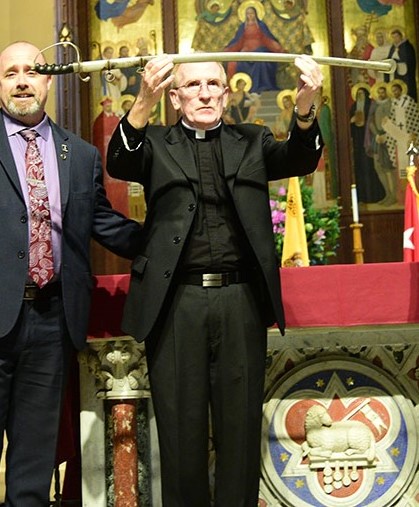
Father McShane was presented with the President’s Saber from the original Fordham ROTC class of 1929, which alumni located for the occasion. “I respectfully request that this saber … be displayed in your office for years to come,” Hoblin said, calling it “a token of our gratitude for all you have done for Fordham, the Fordham ROTC program, and our country.”
At the same time, Father McShane was announced as the first recipient of a new award, the Father Joseph McShane, S.J., Award for Outstanding Faculty and Administrative Support to ROTC.
Among other awards to distinguished cadets, Elizabeth Thomas, of Columbia University, was presented with a separate President’s Saber that is given to a graduating cadet every year; Olivia McNeil, of Fordham, was given the General Jack Keane Distinguished Graduate award, named for the retired general and 1966 Fordham graduate.
Gervais was presented with a Yankee Battalion shillelagh—or traditional Irish fighting stick—of the type awarded to cadets.
‘You Are Ready’
In her address, Gervais told the cadets to “listen to your NCOs and veteran service members, because great officers learn to listen, and continually learn in order to lead,” she said.
She addressed the cadets’ families as well. “These young men and women represent the very best of our nation. These young men and women have decided to serve the people of the United States and defend the Constitution, and that speak volumes about the strength of their character, a strength of character I know was instilled in them by you.”
“They made it to this point in their lives because of the … values you instilled in them—values like loyalty, integrity, duty, honor, and country. We owe you a sincere thanks and a debt of gratitude for supporting your cadet’s decision to serve in … the best trained, the best equipped, the best fighting force, and the most respected force, in the world.”
Among her final words to the cadets? “You are ready.”
“You have achieved so much in such a short period of time,” she said. “In the process, you gained confidence in yourself, in others, and in your team. You have learned self-discipline and what it takes to be the best you can.”
]]>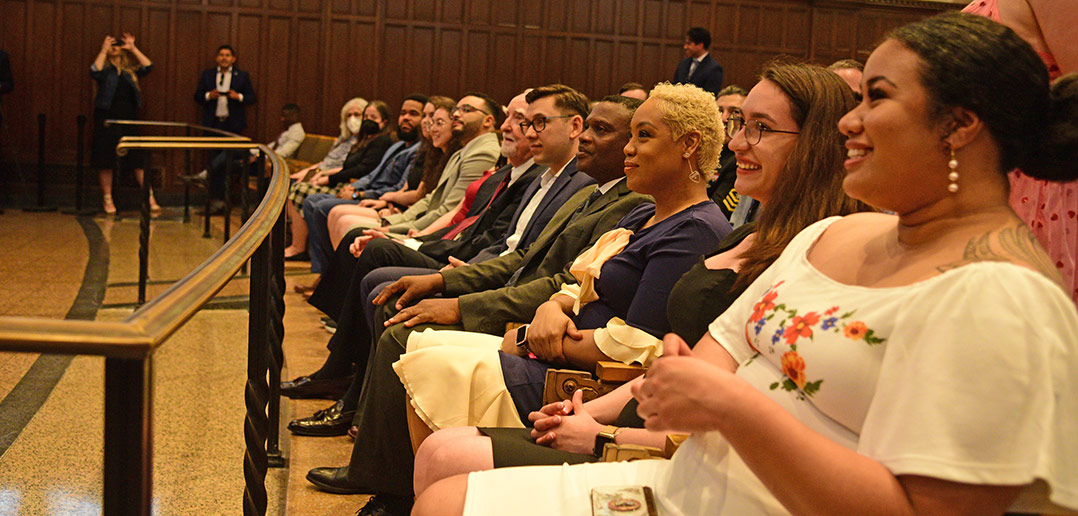
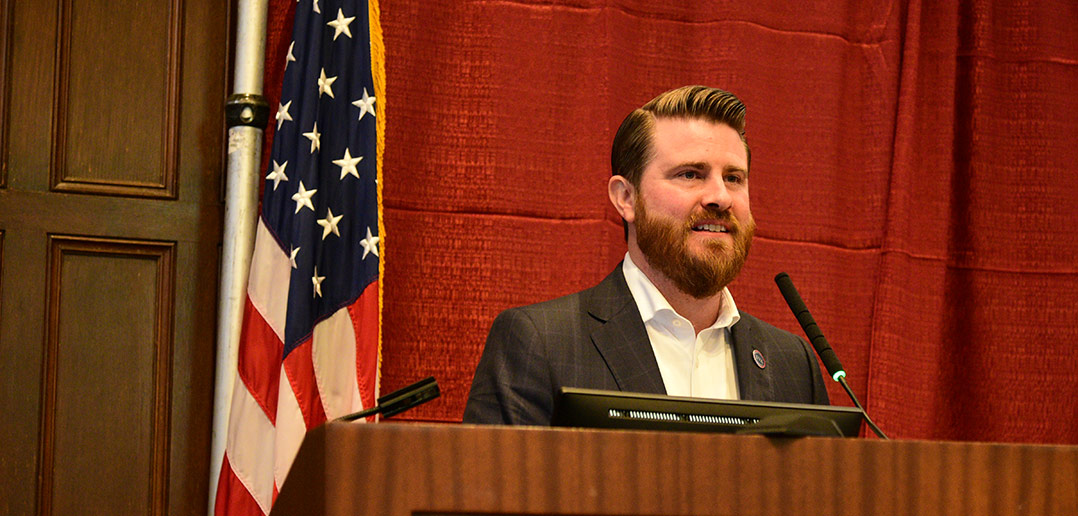
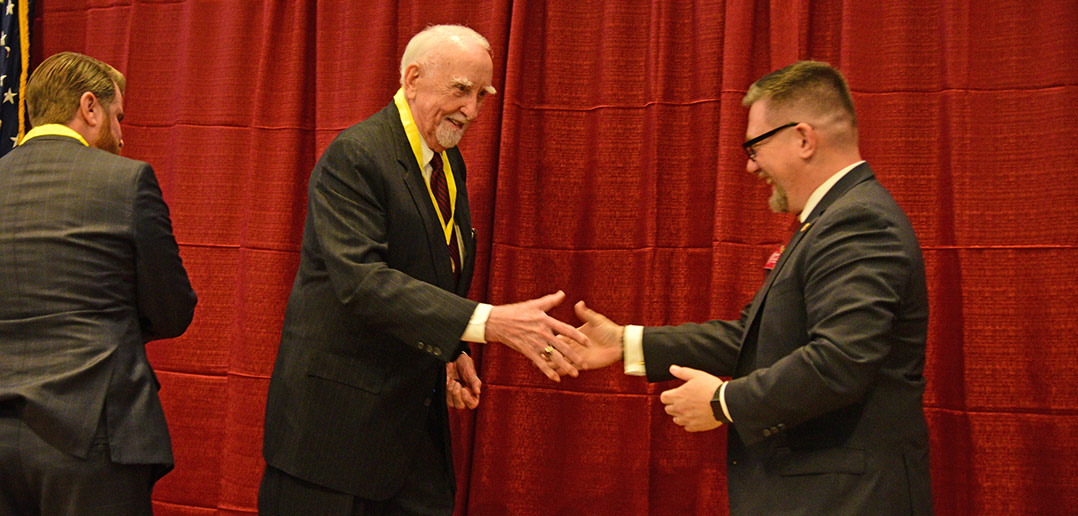
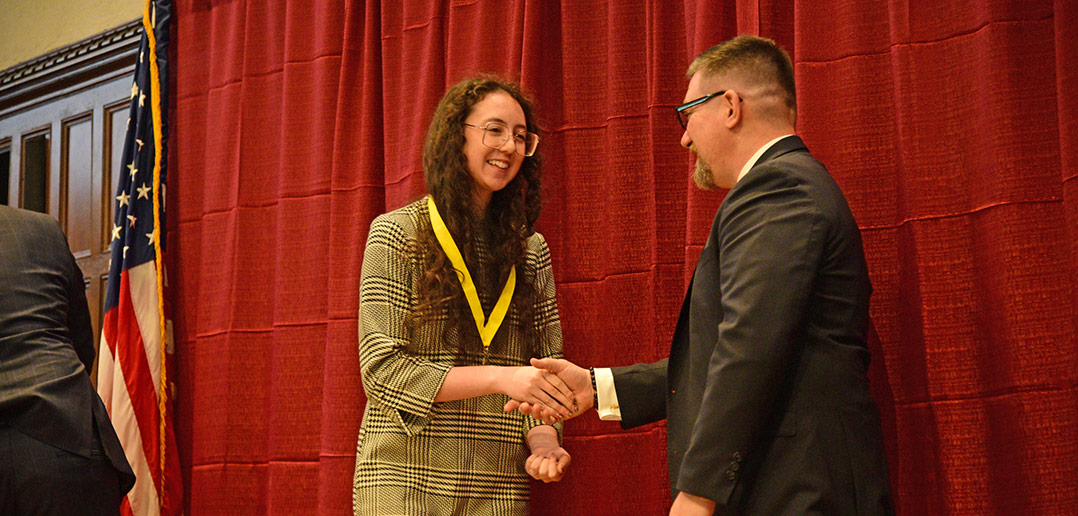
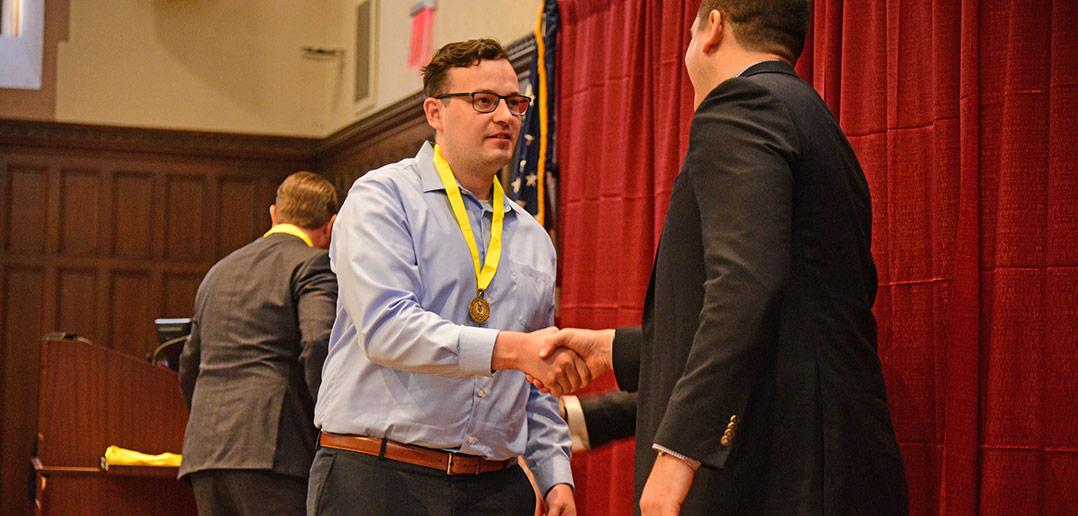
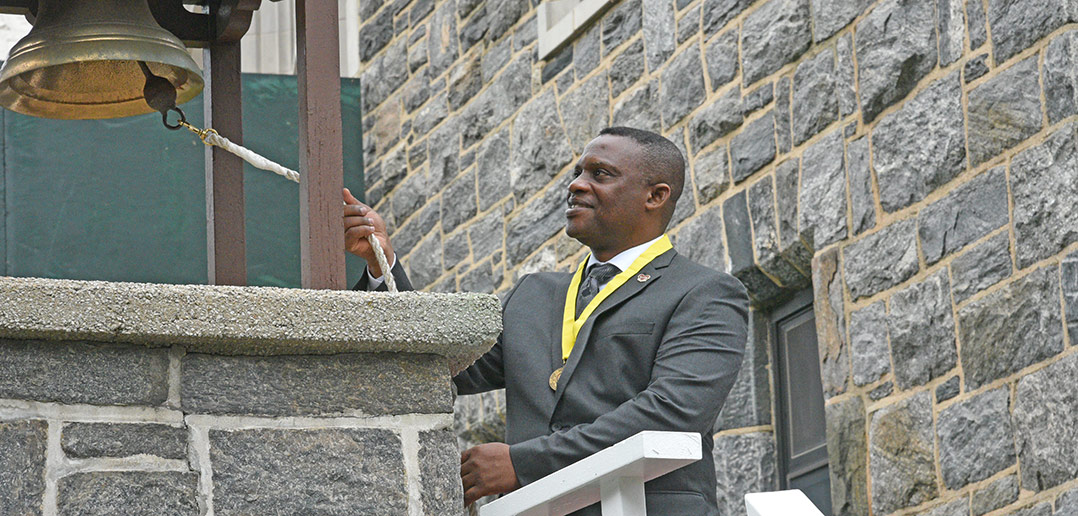
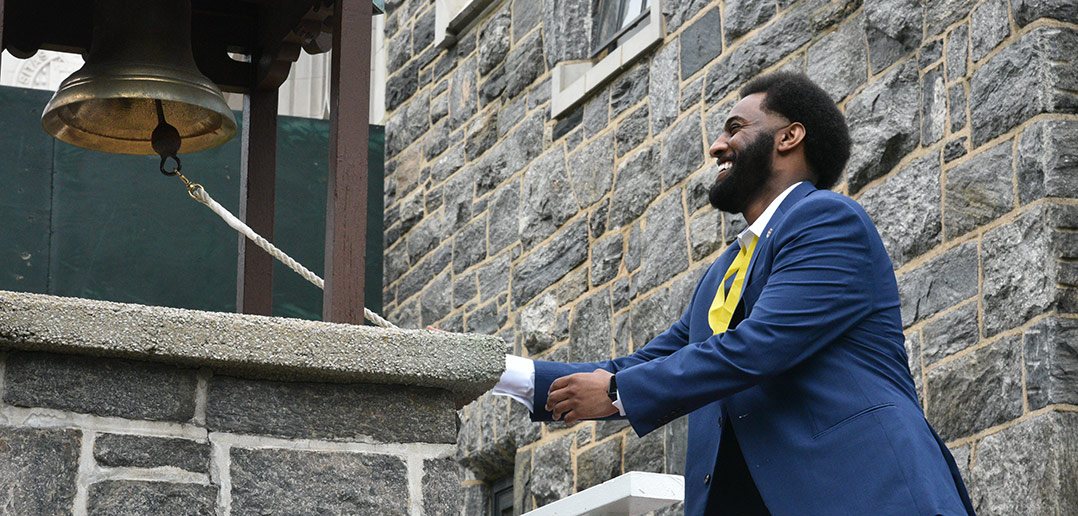
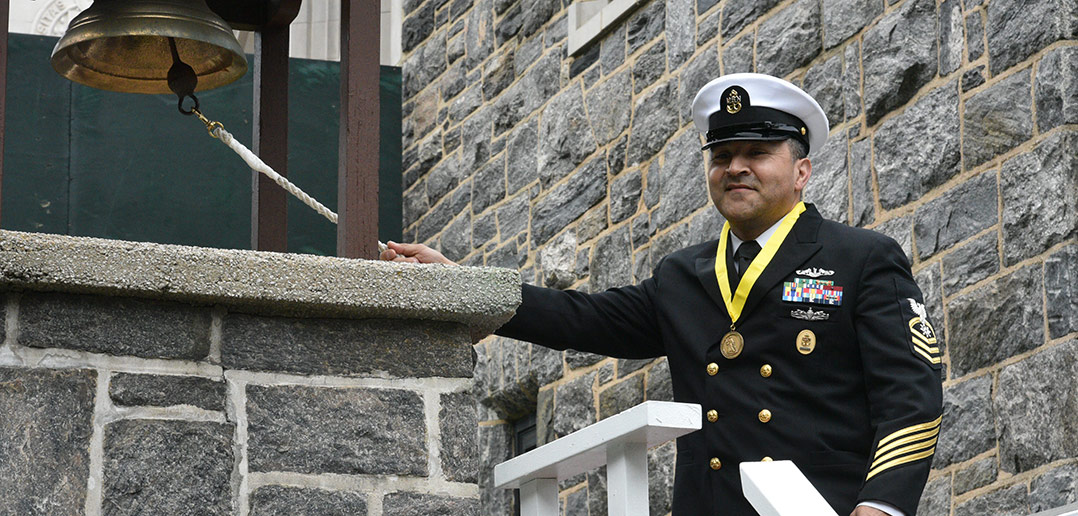
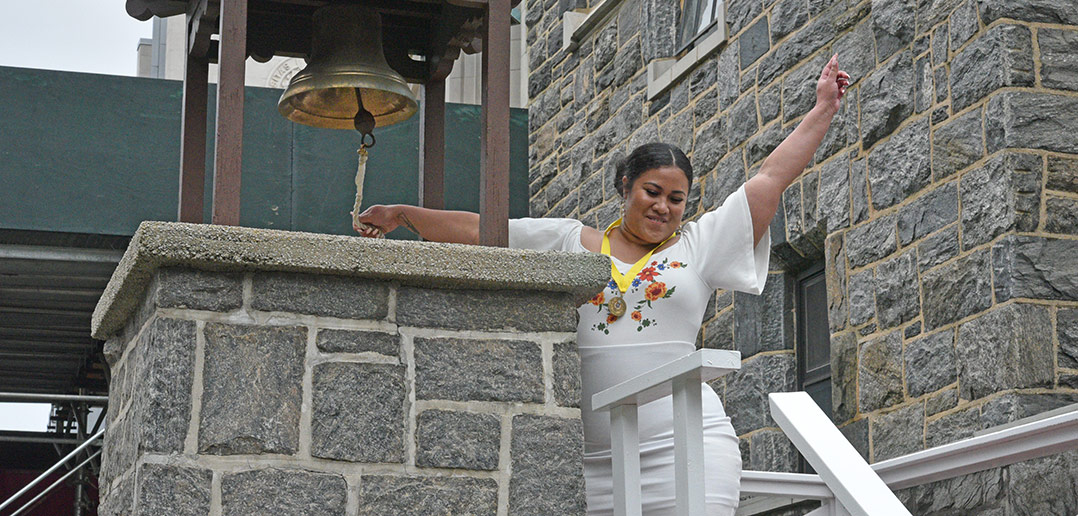
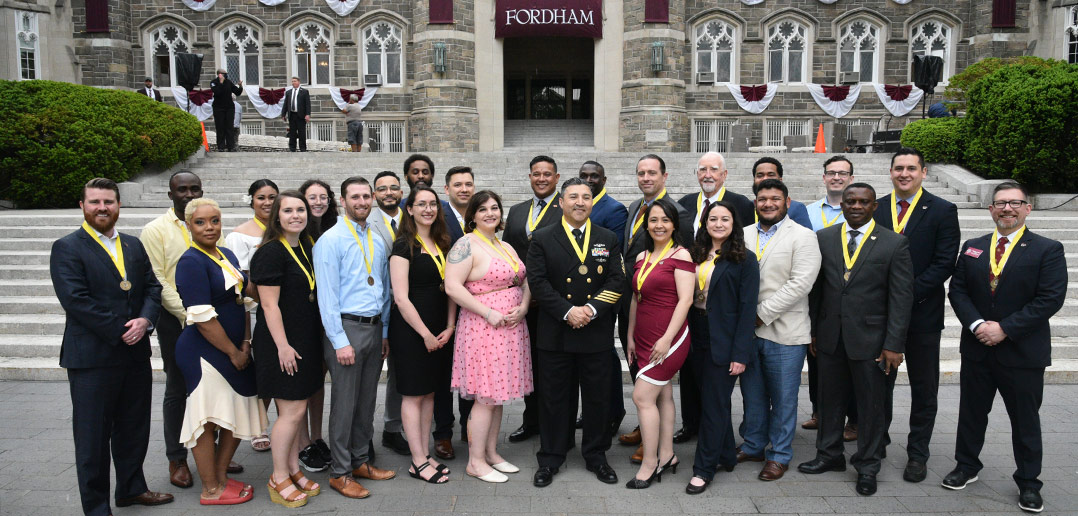 On May 20, the day before its University-wide commencement ceremony, Fordham celebrated its student-veteran graduates—as well as the network of Fordham student vets that has caught national attention for how it supports students making the transition from the military to University life.
On May 20, the day before its University-wide commencement ceremony, Fordham celebrated its student-veteran graduates—as well as the network of Fordham student vets that has caught national attention for how it supports students making the transition from the military to University life.
“Fordham is a very special place, and the student veterans here at Fordham are a really special group,” said guest speaker Jared Lyon, president and CEO of Student Veterans of America, or SVA. At the group’s national conferences, which draw more than 3,000 student veterans from around the country, “people ask questions about what goes on here,” he said. “They want to learn how they can replicate that at their universities.”
He spoke at the Yellow Ribbon Medallion and Bell Ringing Ceremony held by the University’s Office of Military and Veterans’ Services, or OMVS, in Keating Hall at the Rose Hill campus. At the ceremony, 23 of this year’s student veterans and military-connected students—and also Lyon, a student veteran himself—received a University medallion honoring their service. Afterward, for part two of the recognition ceremony, everyone visited the nearby Victory Bell and stepped up to it, one by one, to give it a ring, cheered on by their fellow student vets.
Pandemic Impact
It was only the second time the ceremony had taken place in this format. Inaugurated in 2019, it was modified for the past two years due to the University’s pandemic-related measures. Matt Butler, the University’s director of military and veterans’ services, began this year’s ceremony by calling for a moment of silence to remember the graduates’ friends and family members lost to the pandemic.
“Graduates, you should be proud,” Butler said in his own remarks. “You have endured many, many challenges, and overcome them all, from dealing with the demands of work, school, family, and other obligations [to]classes converted to online and virtual. You have Zoomed, Zoomed, and Zoomed some more. But you never let any obstacles stop you.”
He noted that the graduates were a diverse crowd that included 88-year-old John Lenehan, a Korean War veteran who began his studies at Fordham’s former downtown division at 302 Broadway in the 1950s and returned to the University last year to complete his degree. Last fall, Lenehan became the inaugural recipient of the OMVS’s new True Grit award, inspired by his story, that will go to student veterans who overcome significant challenges in earning their degrees, he said.
A Leading Chapter
Butler also lauded other leaders in Fordham’s SVA chapter, saying “they run one of the top SVA chapters in the country.” As examples, he noted student veterans’ volunteer efforts to help the victims of the deadly fire in the Tremont section of the Bronx in January; their collections to support Ukraine relief efforts; and their mentoring of prospective student veterans, among other efforts.
Student veterans are at the heart of the University’s “coordinated, full-community approach” to meeting the unique needs of student veterans, he said.
Student veterans at the ceremony represented several Fordham colleges and schools. The largest group was graduating from the School of Professional and Continuing Studies; others were graduating from the Gabelli School of Business, the Graduate School of Social Service, the Graduate School of Religion and Religious Education, Fordham Law School, and the Graduate School of Arts and Sciences.
Lyon, in his address, said “thank you for your leadership, your willingness to volunteer on behalf of others.” He pointed to research showing veterans’ high college GPAs and high rates of college completion, and said “you are well equipped with your educations to go on and be the change we’d like to see in the world.”
“Your country needs you. The world is ready for you,” he said. “I can’t wait to see what you accomplish.”
]]>“Juvie has a heart of a servant and is compelled to help her fellow veterans. She is respected by her colleagues and her student veteran classmates as someone reliable, dependable, and trustworthy,” said Matthew Butler, director of military and veterans’ services at Fordham, who joined Segovia at the NatCon student-veteran event in Orlando from Jan. 6 to 8. “Her selection as a finalist speaks to her exceptional leadership and service to the veterans’ community. Although she wasn’t selected as the winner, just being nominated was prestigious and a great platform for her to inspire others to lead.”
Segovia is a U.S. Army veteran and a graduate student at Fordham’s School of Professional and Continuing Studies. In the 2019-2020 academic year, she served as the vice president of Student Veterans of America’s chapter at Rose Hill, where she communicated the needs of student veterans with the undergraduate student government.
Sixteen years ago, Segovia immigrated to the U.S. with her family from the Philippines. Two months later, she joined the military.
“A lot of people thought that was crazy, but I thought of it as giving back. I believe that America is the land of opportunity, and I wanted to make sure that I could give back to the country that has given me and my family so much,” said Segovia, who joined the U.S. Army in her early twenties.
She was stationed in South Carolina, where she was responsible for onboarding incoming soldiers. (She also met her future husband, a fellow service member. They now share a 9-year-old daughter.) However, she wasn’t able to complete her three-year contract with the military. After suffering from a stress fracture that never healed, she was medically discharged from the military with less than a year of service.
Yet her passion for the veteran community remained. More than a decade later, her efforts at Fordham and beyond were recognized at the NatCon event—the largest annual gathering of student veterans in the country. She was recognized on stage, where she reflected on what it meant to be a student veteran.
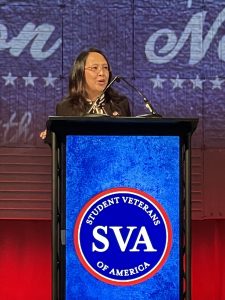
“It was very humbling, being there and seeing my name mentioned among many outstanding veterans. At first, I felt imposter syndrome. It took me a long time to open up about not being able to finish my contract because I was ashamed. But the veterans in my community accepted me and assured me that yes, I am a veteran because of everything I’ve done for our community. I reached a point in my life where I was able to take credit for the things I have done,” Segovia said.
At the conference, Segovia formally introduced herself and spoke at a panel about juggling her responsibilities as a mother, student, volunteer, and former service member.
“Don’t let self-doubt hold you back. Any professional goal, any career choice is ours to make and work towards,” Segovia said at the conference. “If we take away anything from this week, let it be that veterans have skills, and we know how to excel in using them.”
At Fordham, Segovia currently serves as a veterans career liaison for Career Services at Rose Hill, where she has helped student veterans find career opportunities over the past two years. She has educated employers about veteran initiatives, prepared veterans for the civilian workforce, and developed a student veteran career guide that will be launched this spring. Thanks to her efforts, she has increased student veterans’ participation in events, internships, and career services, said her manager.
“Juvie has made a great impact and continues to ensure that the veteran community is able to connect with opportunities,” said Cheretta Robson, senior associate director for Career Services at Rose Hill.
After graduating from Fordham with her degree in organizational leadership this spring, Segovia said she wants to work in a human resource department for a nonprofit. But her ultimate goal is to manage her own nonprofit for fellow veterans.
“I want to ensure that they have career and educational opportunities in the civilian world. There are similar organizations that help veterans, but not many on the East Coast,” Segovia said. “I want to try to make transformational change in people’s lives.”
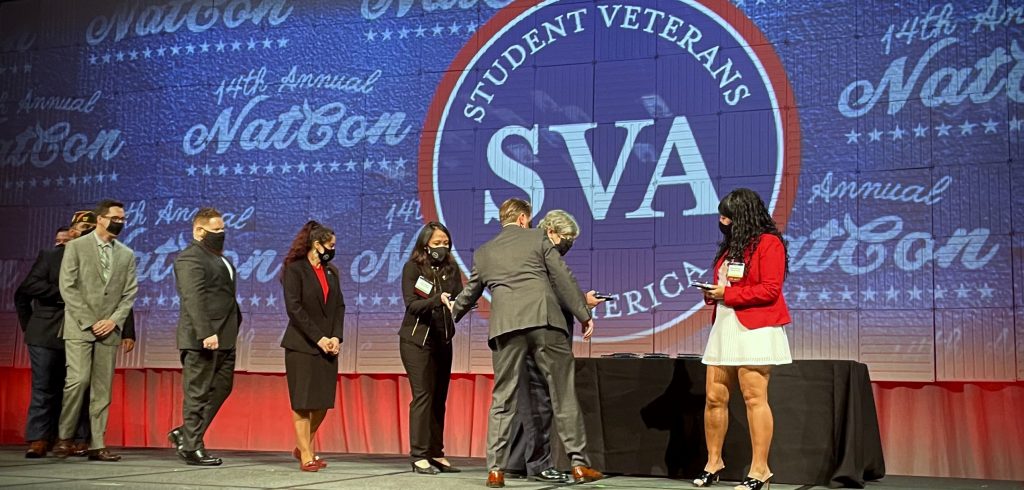
Those were the words that Good Morning America co-host Michael Strahan said to Matthew Ryba, PCS ’15, in a surprise tribute to him on the ABC program on Veterans Day.
Ryba is a Marine Corps veteran of the wars in Iraq and Afghanistan who now serves as the director of community outreach and education for NewYork-Presbyterian’s Military Family Wellness Center.
“You protected lives, you saved lives, and now you’re changing lives,” Strahan continued, before playing a video tribute featuring Ryba’s wife, friends, colleagues, and fellow veterans—as well as a separate message from one of Ryba’s favorite NFL players, Rob Gronkowski.
Ryba’s work centers on helping his fellow veterans with their mental health, especially the lasting effects of PTSD. He recently co-authored a paper titled “Neural changes following equine-assisted therapy for posttraumatic stress disorder: A longitudinal multimodal imaging study,” which looked at how time around horses can help veterans with PTSD. It came out of the Man O’ War Project, led by co-directors Prudence Fisher, Ph.D., and Yuval Neria, Ph.D., who is also co-director of the Military Family Wellness Center.
For the project, which took place at the Bergen Equestrian Center in northern New Jersey, Ryba helped recruit 63 veterans who had been diagnosed with PTSD. They were brought to the equestrian center for eight weekly, 90-minute sessions in the summer of 2019, and there, they groomed the horses, led them, and participated in trust-building exercises. Mental health professionals evaluated the trial participants, who also received brain scans before and after the sessions.
Their results, published in the Journal of Clinical Psychiatry, found that half of the patients recovered from their PTSD and continued to show improvement months later. According to an article in NewYork-Presbyterian’s Health Matters, the veterans “reported fewer feelings of depression, distance from others, inability to sleep, anger, and suicidal thoughts,” and “less hypervigilance, nightmares, and feelings of needing to be alert and on guard.” The researchers also found structural and functional changes in the brain.
“Horses almost mirror the emotions of the human that they are with,” Ryba told Health Matters. “So if you walk up to a horse and you’re scared to touch them and show all this fear, they sense that and react with a fear response. Seeing your own fear mirrored in another animal helps you make connections with what’s going on inside you, and make internal adjustments like, ‘If I calm down, the animal will calm down.’”
The team is now piloting a similar study at the center for adolescents with PTSD, as well planning for a larger randomized trial examining the effects of equine therapy on PTSD.
Ryba, who dealt with dozens of his fellow service members dying during his time in the Marine Corps, told Health Matters, “If I’m not helping this population, then I am not doing the right kind of work.”
]]>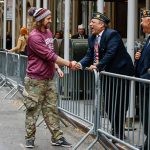

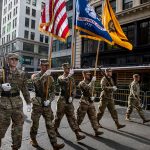
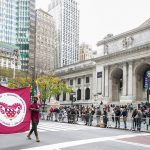
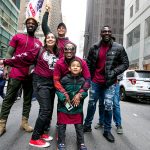
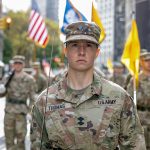
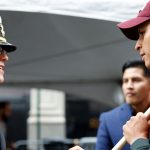
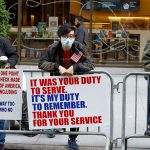
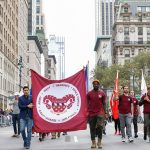
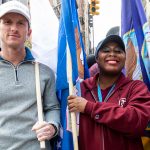
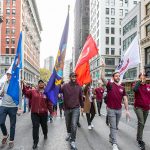
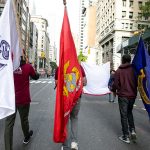
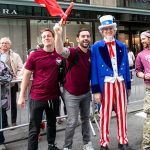
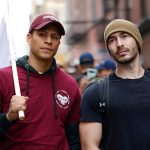
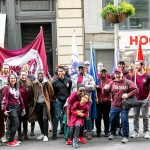 Ram pride was strong on Wednesday, Nov. 11, as Fordham’s military community came out celebrate and honor the sacrifices of our nations veterans. ROTC students, student veterans, alumni, administrators, friends and family joined fellow veterans in New York’s annual Veterans Day parade.
Ram pride was strong on Wednesday, Nov. 11, as Fordham’s military community came out celebrate and honor the sacrifices of our nations veterans. ROTC students, student veterans, alumni, administrators, friends and family joined fellow veterans in New York’s annual Veterans Day parade.
The parade, which first took place 102 years ago, is the largest in the country, featuring over 300 marching units, over 25,000 marchers, 30 floats and over 150 military vehicles. It begins at Madison Square Park, where a ceremony is held at the Eternal Light Memorial, and proceeds up Fifth Ave to 42nd Street.
]]>“Even though there’s a lot of support for veterans today … there are still some things that aren’t covered,” such as off-campus housing, said Ken Rogozinski, GABELLI ’85. “If you hadn’t saved money above and beyond the military benefits that you got for continuing your education, it could be tough as a student transitioning from the military into a college setting.”
Rogozinski said that instead of being able to fully focus on their studies, some veteran students “have to worry about finding a part-time job or doing things like that, to be able to make ends meet.”
That’s what inspired him to make a gift to Fordham this summer to establish the Veteran Emergency Fund at the Gabelli School of Business. The dedicated fund will assist current Gabelli students who are veterans or dependents of veterans.
“Reflecting on the experience that I had and that my brother had, it made me think that there’s a need there,” said Rogozinski, who is the CEO of America First Multifamily Investors, L.P.
Gabelli School of Business Dean Donna Rapaccioli, Ph.D., said that this fund helps Fordham fulfill its mission and support its students.
“The Veteran Emergency Fund exemplifies the individual care we aim to provide to all Gabelli School students,” she said. “Ken’s generosity and willingness to help demonstrates to veterans that there is an extra support system for them at Fordham and a very grateful community that is ready to help them.”
The funds, which are to be used for housing, food, tutoring, mental health services, books, school supplies, transportation, and other expenses, would be distributed by the dean’s office on a case-by-case basis. Students can go directly to the dean’s office or can be referred from the Office of Military and Veterans Services.
One of Rogozinski’s biggest goals with establishing the fund is to help put student veterans in the best possible position to succeed.
“You’ve got veterans who haven’t been in the classroom for quite some time, who have been away for four to six years … and have to come back into an academic environment that can be challenging at times,” Rogozinski said. “And so to put people in the best possible position to succeed and not get behind and then have to play catch up—we’d love to see the funding be used for something like that.”
Rogozinski also said that he hoped the fund could help make the Gabelli School even more attractive to veteran students. As of fall 2020, more than 40 veteran students were enrolled in Gabelli undergraduate and graduate programs.
“My brother and I have a very strong connection to the school, and so we were really happy to be able to come up with something like this that I think really fits a need for a group that we’d like to see more represented on campus,” said Ken, noting that he and his brother established the fund together.
Alumni and other Fordham community members can also participate in supporting the fund. For more information, please contact Patrick Raftery at [email protected].
]]>